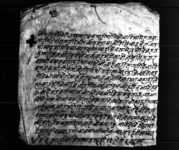A written power of attorney granted by Ratnakumārī Pãḍenī Kṣetryānī (VS 1943)
ID: K_0175_0059
Edited and
translated by Rajan Khatiwoda
Created: ;
Last modified: 2019-11-13
For the metadata of the document, click here
The accompanying edition, translation/synopsis and/or commentary are available under the terms of the Creative Commons Attribution-ShareAlike 4.0 International License
Abstract
In this deed Ratnakumārī Pãḍenī Kṣetryānī grants Bakhat Bāhādura Thāpā Kṣetrī power of attorney to represent her at court of law.Diplomatic edition
[1r]
1श्रीः\1२४1४३1लिषितम्नर्देवीटोलवस्न्यारत्नकुमारीपडेनिक्षेत्र्यानीआगेराजकु2मारीपडेनीसंगगुठिकोअंसकाझगडामाकोटिलिंवाटमेरानाउ
3माम्यादटासिदियाकामुद्दामाम्यादभित्रसामेल्भैनीजराज
4कुमारिसंगजोरिपुर्पक्षेगर्नलाईमेरोसाटोलुभुसिरुटार
5वस्न्यावषत्वाहादुरथापाक्षेत्रीलाईवारीस्गरीदिञानि
6जराजकुमारीसगजोरीपुर्पक्षेगर्दाहार्यादंडजित्याजिताउ
7रीतिर्यामामेरोमन्जुरछकाल्कलानिजवषत्वाहादुरले
8हार्यादंन्डरजित्याजिताउरीमलाईलाग्नुपर्न्याहोईनभनिउजु
9र्गर्न्याछैनउजुर्गर्याभन्याऐनवमोजिम्वुझाउलाभ
10निमेरामनोमानषुसिराजिसंगनिजवषत् वाहादुरथापा
11लाईअक्त्यारगरिदिञाँयेसवात्कासाछिनर्देवीटोल्
12वस्न्यापुर्णचन्द्रपाध्याभट्टराई१ टेङ्गल्टोलवस्न्याकुलवि
13र्ज्यापु१लेषकसाछिपलान्चोक्घरहुन्यानर्देविटोलमा
14डेरागरीवस्न्याउमाकान्तपाध्याप्याकुर्याल् १ईतीसम्वत्
15१९४३साल्मितिआषाडशुदी१२रोज३शुभम् ----
Translation
[1r]
241
432
[This is a] written [statement of] Ratnakumārī Pãḍenī Kṣetryānī, a resident of Naradevī Ṭola. Āge: Concerning the legal dispute with Rājakumārī Pãḍenī over shares of the guṭhī—a deadline for which was posted under my name by the Koṭiliṅ [to appear at court of law]—I [hereby] grant Bakhat Bāhādura Thāpā Kṣetrī, a resident of Siruṭāra, Lubhu, power of attorney to be present apposing arguments against Rājakumārī on my behalf within the given deadline. Whether [my attorney,] having pled the case against Rājakumārī is defeated or wins, I will accept [the outcome], be it a fine or winning fee. I grant authority to the said Bakhat Bahādura Thāpā of my own will and volition, stating: "I will not lodge a complaint in the future to the effect that a fine, in case the said Bakhat Bāhādura is defeated, or a winning fee, in case he wins [the suit], should not fall to me [to pay or accept]. If I lodge such a complaint, I will accept [whatever is decided] in accordance with the Ain."
The witnesses to my statement are:
Purṇacandra Pādhyā Bhaṭṭarāī, a resident of Naradevī Ṭola 1
Kulavir Jyāpu, a resident of Ṭeṅgal Ṭola 1
Umākānta Pādhyā Pyākuryāl, the scribe [of this document] and a witness, being a permanent resident of Palāncok and [currently] living in rented quarters. in Naradevī Ṭola 1.
Tuesday, the 12th of the bright fortnight of Āṣāḍha in the [Vikrama] era year 1943 (1886 CE).
Commentary
This document is part of an extant set of documents which deal with a family dispute between Rājakumārī Paḍenī (the lawfully married wife of Pṛthī Bahādura) and Ratnakumārī (the wife of Rājakumārī's husbands's younger brother). As mentioned elsewhere (see K_0172_0063), this dispute arose in VS 1915 (1858 CE) after Pṛthī Bahādura committed incest with the non-widowed wife (sadhavā) of a 4th-generation cousin and with a similarly distantly related female in-law (cāra pustākī didī ra bhāujyū). After committing incest, he fled to the Terai (Madhyadeśa) with his entire family and household personnel (see K_0172_0063). Later, Rājakumārī returned from the Terai and received expiation for having accepted rice from and having had sexual intercourse with her incestuous husband (see K_0175_0032, K_0175_0033 and K_0175_0034). Furthermore, she initiated a court case to receive her rightful share of the inheritance. Ratnakumārī, her son and other members of her immediate family tried to avoid giving her any property, accusing her of being guilty of having willingly engaged in the expiated conduct (See K_0175_0018 and K_0172_0058). Rājakumārī for her part insisted on her rightful claim, mentioning the expiation she had undertaken by order of authorities and offering further evidence.
In the present document, Ratnakumārī grants power of attorney to Bakhat Bāhādura Thāpā Kṣetrī to represent her at a court of law regarding this family dispute. The article on Court Procedure of the Mulukī Ain (MA-KM 1854 35.24) deals with eligibility requirements and the procedure for appointing an attorney. According to Section 24 of this article, only someone among the respectable bhāībhāradāras can appoint a person as his attorney, except in cases of crimes pertaining to homicide (punishable by lifetime imprisonment (dāmala)), illicit sexual intercourse or shared cooked rice and water. For this a written power of attorney is to be issued stating: “I am sending such and such a person to represent me in such and such a case, granting him power of attorney. If he wins the case, it is my victory. If he loses it, it is my defeat. Whatever is decided according to the Ain, I will accept. I will not lodge a complaint.” The present written power of attorney follows the format and phrasing prescribed in the Ain.

